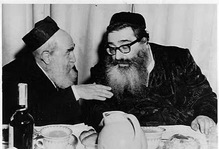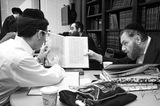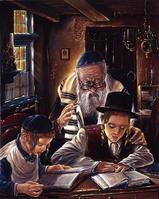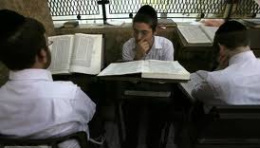Talmud Torah Defines Us
|
The Sages teach that Torah study is equal to all of the other commandments combined. They also teach that the reward for the study of Torah is equal to the combined rewards of all other commandments (Mishna, Peah 1:1; Yerushalmi ad loc; Bavli, Moed Katan 9b).
Without continuous Torah learning the universe would revert to being formless and empty, this means, it would serve no purpose. (Genesis 1:1) Thus says the prophet, "So says Gd, were it not for my covenant day and night [of learning Torah], I would not maintain the ordinances of heaven and earth (Jeremiah 33:25). Only after Gd created the Torah, the spirit and purpose of the universe, did He create the physical universe. The more intensely we study Torah, the more we are attached to the source of life and the spirit of the universe. |
|
|
The Talmud (Makos 23) observes that the Torah commands us with 613 Mitzvos which are in truth 613 guidelines. The scope of these guidelines encompasses all of life; from the rituals of the Temple and required dress codes to the imperatives shaping business dealings and obligations of interpersonal relationships. Yet not one of them is complete as it is in the Torah. Every Mitzvah requires human input in order to complete it and give it substance and definition. And I don't mean human input for its performance, I mean human thinking and emotional evaluation in order to define Gd's command. The nature of Talmud Torah defines our relationship with Gd. There is no other commandment that does this; not even the commandment to sacrifice our life for the sake of declaring our loyalty to Gd. Our connection to Gd is not that of loyal and obedient servants who only wish to know what it is that their Gd wants them to do. When our Sages speak of being servants of Gd it refers to being servants to the study of Gd’s Torah, His Wisdom. But His Wisdom as disclosed in the Torah, the revealed Five Books of Moshe Rabbenu, is incomplete. We, in our relationship with Gd, are commanded to understand Gd’s Torah and develop it. Our relationship with Gd is founded upon our being able, to get into Gd ‘s mind and complete His Torah. One who is mentally unsound is not commanded to follow any of Gd's laws. It is not a question of whether they can or cannot PERFORM the commandments, it is a question of whether a relationship, a thinking relationship can be cultivated. |
|
This is apparent throughout the Talmud, every page of which is replete with debate, discussions and speculations about what exactly it is that Gd is commanding us to do; as though Gd is incapable of providing us with clear instructions in the first place. We are empowered and charged by Gd to assess and understand His commandments. A well known Mishnah, which has found its way into the daily service, emphatically declares that the commandment to learn Torah is not only the greatest of them all but that it is greater than all the others combined.
As we declare in the Shema: “and whilst travelling on the road”, meaning that our engagement with Torah is so powerful that it becomes part of our identity and penetrates to our subconscious, the pleasant meandering of our idle mind. Whilst others may dwell upon the random shapes of clouds, or unfulfilled ambitions or previous conquests; we are directed to wander with and through the wisdom of the Almighty. RaMBaM [Ch 10 Hilchos Teshuva] in fact describes this as the addiction that the lover has for his beloved – he can not shake that image from his mind no matter what he may be doing. Without a proper understanding of the Mitzvoth and their details, it is impossible to correctly fulfil the commandments of the Torah. "Great is Torah study, for it leads to performance" (Kiddushin 40b). But this is not the reason we continue to study the same issues and same ancient discussions without letup. Torah study engages the mind, our soul; it is therefore the most spiritual of all Mitzvos. It is a debate between opinions, scholars and all those who seek Gd. It is an engagement with Gd, where Gd’s opinion is not automatically the final binding ruling. In this engagement Gd celebrates the victory of His adversary because that is Gd’s success. |








